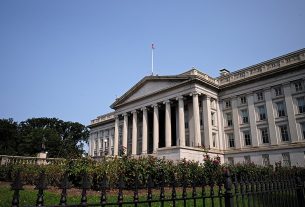
The second progress report on the climate and environmental objectives of the 8th Environment Action Programme (8EAP) published by the European Environment Agency on Thursday shows that the EU is partially on track towards its 2030 climate and environmental goals and targets, demonstrating that more must be done.
The assessment shows positive progress in certain areas, including reducing greenhouse gas emissions, improving air quality, and promoting green finances. However, more effort is needed to reverse the declining trend in biodiversity and ecosystems, achieve systemic change across systems (e.g. food, energy, & mobility), and ensure well-being for all within planetary boundaries.
This report highlights the urgency of implementing agreed legislation and finalising pending legislative acts proposed by the Commission. It also recognises the importance of setting new initiatives, such as boosting water resilience and delivering systemic changes in energy, industry, agriculture and mobility. Accompanying measures need to be stepped up to enable effective and correct legislation implementation on the ground.
Progress is expected in shifting taxation from labour to activities using more resources and causing more pollution. In addition, more progress is needed across the EU to phase out environmentally harmful subsidies, in line with the commitment of the Global Biodiversity Framework.
To ensure we live within the planetary limits, more progress is also needed in sustainable production and consumption patterns, to reduce excessive use of materials and energy. Resource overuse leads to higher levels of air, water and soil pollution and leads to significant pressure on ecosystems and biodiversity. Addressing production and consumption will also help the EU economy to become more efficient and sustainable while boosting competitiveness, resilience and strategic autonomy.
The trends and assessments have not changed since the first report. The only exception is energy consumption, for which the assessment slightly improved. Despite recent progress in reducing energy consumption, substantial efforts are needed to meet the new 2030 energy efficiency targets.
The progress report is based on the 8th EAP monitoring framework, presented by the Commission in 2022. It monitors and assesses progress in achieving climate and environmental objectives in the EU and its 27 Member States. Building on data evidence and expertise, the report assesses EU progress towards climate neutrality, a resource-efficient economy, reversing biodiversity loss and cutting pollution.
Commissioner for the Environment, Water Resilience and a Competitive Circular Economy, Jessika Roswall, said:
“The EEA’s 2024 progress report is a stark reminder of the urgency to accelerate policy actions on the ground. To achieve our targets, we need a shift of mind set and a transformational step change. We must work with all stakeholders and focus, first of all, on implementing and enforcing agreed legislation. This is key to boost circular business opportunities, our competitiveness and economic resilience to external shocks.”
Commissioner for Climate, Net Zero and Clean Growth, Wopke Hoekstra, said:
“With this progress report, it’s clear once more that we need to step up our efforts to reach net-zero emissions. While we have made good progress—especially in cutting emissions and promoting green finance—there is a long way to go and no room for complacency. Every sector must do its part. To create a climate-neutral and competitive Europe, we need to push forward with the policies we have agreed on, increase investments, and drive real change in energy, industry, and mobility.”
Background
The 8th Environment Action Programme reiterates the EU’s long-term vision for 2050 of living well and within planetary boundaries. It sets out 2030 priority objectives and the conditions needed to achieve these.
Building on the European Green Deal, the action programme aims to speed up the transition to a climate-neutral, resource-efficient economy, recognising that human well-being and prosperity depend on healthy ecosystems.
The 8EAP Decision, adopted in 2022, contributes to delivering the objectives set in the European Green Deal. The EAP is a legal tool to engage governments, administrators and stakeholders to contribute to achieving environmental objectives.
In 2022, the Commission adopted an EU monitoring framework for the 8EAP to measure progress towards attaining the Programme’s 2023 and 2050 priority objectives, in consultation with Member States and stakeholders. The framework monitors progress in the EU and its Member States based on available data from official European sources.
It includes 28 indicators addressing the priority objectives of climate change mitigation and adaptation, circular economy, zero pollution and biodiversity, as well as the objective of addressing climate and environmental pressures, the enabling conditions and the overarching objective of living well, within planetary boundaries.
